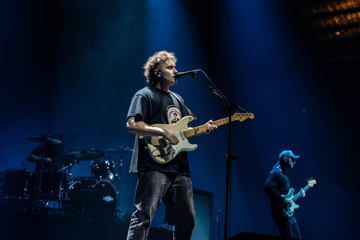Just Another Love Song
"Trying to get more into like [that] four people playing kinda feel. There’s really no rules about how you go about producing or recording a song, it’s all about what you think can make the best presentation of the idea."

Catching up with Jimmy Eat World frontman Jim Adkins finds him hanging out in Phoenix, Arizona, tying up the final loose ends before heading over to Europe to begin the arduous touring cycle for Damage, the quartet's eighth record. Performance-wise, though, the band are already fighting fit and eager to tackle these dates with vigour, having recently broken in a few of the new tracks with a home state tour that saw them hit five small towns in Arizona – from Sierra Vista to Flagstaff - to reconnect with their roots.
“That's something that I wanted to do for a really long time, and it finally worked out that we could do it right now, and it also worked out because we hadn't played some of these songs out before,” explains Adkins. “It was a great way to give back to local fans who have supported us for a really long time and also try some brand new stuff.”
Twenty years on from their original garage days in the city of Mesa, roughly 30 clicks west of the state capital, Adkins admits it's a milestone that has been hard to dodge for the band. However, he assures that their latest release is far from a victory lap made simply to pay homage to their career thus far. “It's really hard not to put into context the entire history of the band, especially when you're somebody like us who has been a band for a long time. I don't think Damage has anything to do... I wouldn't view it as something that sums up [our] career, it's really only what we know and like and can do with what we have right now.” However, to still be relevant in a rock'n'roll world with far more bravado than these four gents hold is a solid accomplishment, especially for a band that's biggest goal was “to get [their] music onto a seven-inch”.
“That was like, 'Dude, if we could make that happen then it's legit,'” he remembers. “[The first time I held a pressing in my hand] I couldn't believe it. It was just a test pressing, and everyone came over, I think we were at our drummer [Zach Lind's] house at the end of a band practice just getting ready for a show, and we put it on and we just couldn't believe it,” he laughs. “Like, 'Hey, it's me, I'm on the record.'
Don't miss a beat with our FREE daily newsletter
“[But] the longer that we are a band, I think it's easier to appreciate [those things] and to appreciate being a band. It's a huge deal that anyone would want to take their time and spend it... To find something in what we do that relates to them, and that they can choose to make their own experience. It's a huge compliment that anyone would care. And the fact that we've been able to do it so long and people still care, we're definitely grateful for that. [And] that might be one of the reasons that we're still around. You have to really take in the good things that are happening and be grateful for them because it truly is an amazing experience.”
Damage sees the band operating as an airtight unit - from the familiar chord-driven bounce of Appreciation and single, I Will Steal You Back, to more fragile moments like Byebyelove, not a moment is wasted during the punchy full-length. Working on the tracks since the beginning of the year, a time that “seems like a while ago now” for Adkins, the quartet were committed to stripping back to the raw ingredients of the band once more and discovering what it was about Jimmy Eat World that swallowed them whole in the first place.
“I think maybe getting away from things, and relying on the studio as an instrument,” he reveals when pushed to discuss their initial goal for the album. “Trying to get more into like [that] four people playing kinda feel. There's really no rules about how you go about producing or recording a song, it's all about what you think can make the best presentation of the idea. And sometimes that means throwing the idea of playing that song live out the window, y'know what I mean? It's just gotta be the song. [But] whether it was conscious or not, the material on Damage is definitely more jamable than some of our other work we've done in the past.”
To help peel back the layers of who they were as a band, Jimmy Eat World ventured due west to bunker down at the Los Angeles home studio of Alain Johannes, a man who knows all about the sounds of the desert, having invested plenty of time – in a recording and performance scope – into the music of Queens Of The Stone Age and Eagles Of Death Metal, among many others. “Yeah, that dude's a shredder,” Adkins understates, “there's no two ways about it.” But Johannes didn't push the frontman and fellow guitarist Tom Linton to start wheeling off face melters themselves. That wasn't what it was about.
“I never felt like that was... I think that getting the best out of us was more about the song as a whole. If anything I think that the material on Damage is less reliant on riffs - it's really about the song as a whole [throughout]. There [are] riffs all over the place but they're all complementing the song; I don't really feel like there's something, like a riff where the song is built around it.”
The sleeze and steez of the City of Angels didn't affect the album, either. “We've been going out to LA for years now for different things, and I think we're at a place now where we can have fun with [making an album]. That's all we did when we were there, was lived in the recording; it's not like we were out clubbing or anything. Not like clubbing is something that any of us ever do anyway. It was good to just go somewhere and lock down.”
Instead, the four-piece worked beneath a thematic umbrella - not unlike the one found on the cover of Damage - to deliver the sort of tracks that Adkins has long been drawn to. It directed the lyrical content of the songs, helped shape the overall sound and tips its cap to two decades of emotive rock from Jimmy Eat World, whether Adkins will admit it or not. “I got really into the idea of building the material around a central theme, and just as a basic, basic jumping off point I went with the idea of love songs,” he reveals. “But the kinda love songs that appeal to me are the ones that deal with adversity and emotional injury and heartbreak. Those are types that I feel are more captivating.”







